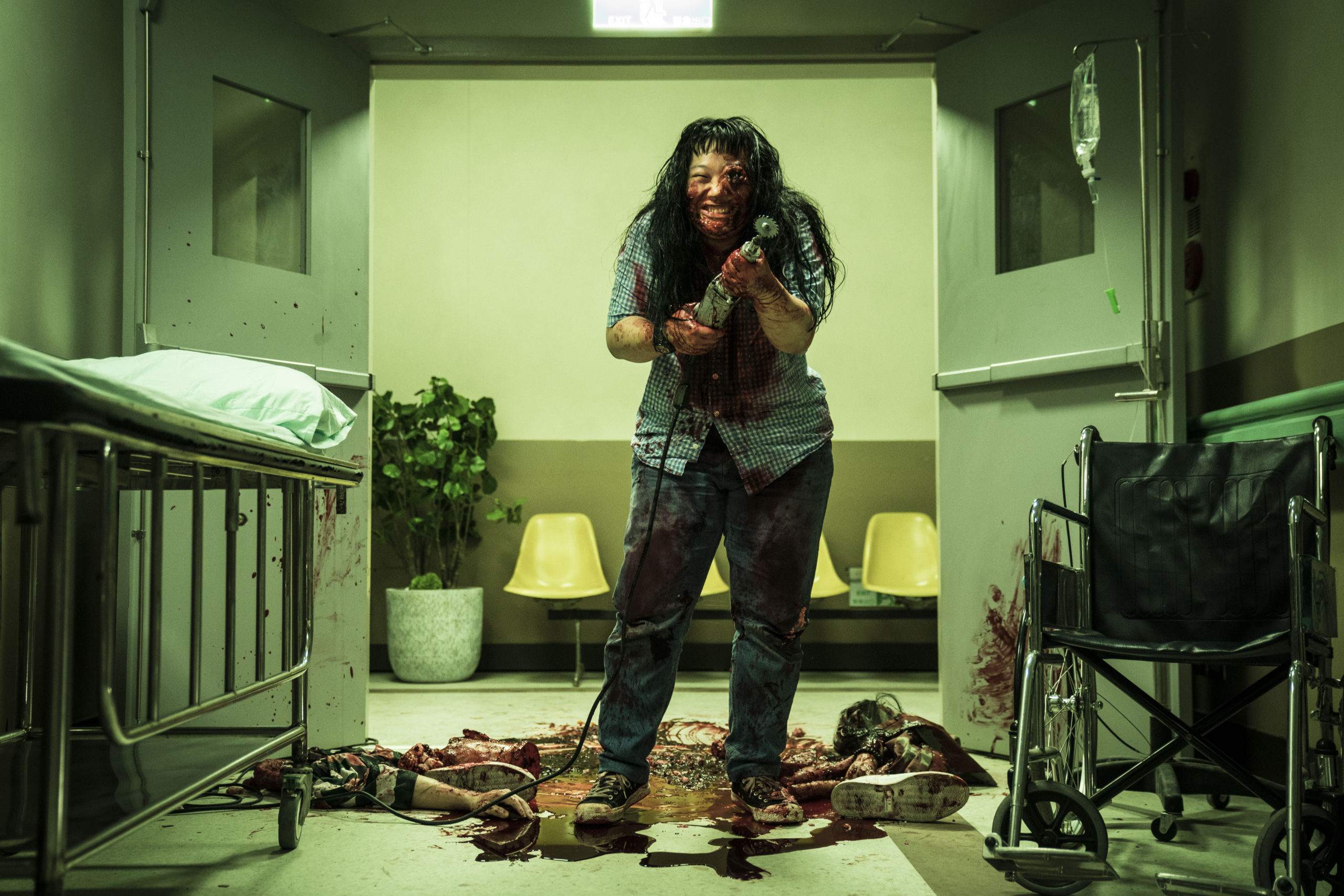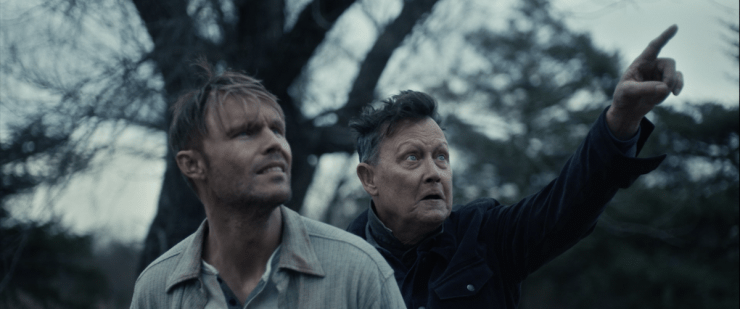Editorials
10 Movies We Can’t Wait to See at This Year’s Fantasia International Film Festival!

This year marks the 25th anniversary of the Fantasia International Film Festival, running from August 5-25. Founded in 1996, this Montreal-based fest dedicates itself to exploring diverse realms of genre cinema from across the globe. The fest doesn’t just introduce new international gems but countless new talents and voices as well.
The J-horror craze of the early aughts? It’s often credited to Fantasia, which premiered Ringu in 1999, where Dreamworks acquired it. The fest introduced Takashi Miike to North American audiences with the 1997 premiere of Fudoh. The festival celebrates 25 years of rich history that includes award-winning features, celebrated genre talents, and beloved horror favorites.
Fantasia’s still going strong, too, with their robust lineup for this year offering a slew of highly anticipated titles. Here are titles that Joe Lipsett and I can’t wait to see:
Joe’s Picks
#Blue_Whale

The slow, but regular trickle of Screenlife horror continues with #Blue_Whale, a Russian film co-produced by Timur Bekmambetov. The premise sounds amazing: a rash of teen suicides in a Russian town is linked to a popular social media game aimed at chipping away at its victims’ lives. The fact that the film is inspired by real cybercrimes and has ties to the Japanese Momo hoax makes this one of my most anticipated films of the fest.
Don’t Say Its Name

The increasing prominence of Indigenous horror, from Stephen Graham Jones’ bestsellers to Jeff Barnaby’s kick ass Blood Quantum, is both welcome and overdue. Don’t Say Its Name sounds like another great addition. The film follows a dead environmental activist brought back to life as an ancient spirit reborn outside a small northern town, which ties directly into Indigenous teachings about the land and spirituality. Hopefully it’s also very spooky!
Hellbender

I’ve had my eye on the Adams Family since I caught their film The Deeper You Dig at Fantastic Fest in 2019. The DIY family of filmmakers – comprised of John Adams, Toby Poser, and daughter Zelda – wrote, directed, and starred in an astonishingly polished film on a bare-bones budget. Now they’re back with Hellbender, a new supernatural film about “a lonely teenage girl who finds guidance in her family’s suppressed supernatural lineage.” The logline is a little vague, but judging from The Deeper You Dig, expect some fantastic dreamy nightmare imagery.
King Knight

A new film from indie director Richard Bates Jr is always worthy of celebration. Bates Jr is the creative mind behind a host of uncomfortable, cringey comedy/horror films, including Excision and Trash Fire. The new film reunites him with frequent collaborator Matthew Gray Gubler and Westworld’s Angela Sarafyan who play “husband-and-wife high priest and priestess of a coven of witches in a small California community” who unearth a secret about their past. I’m getting slight Santa Clarita Diet vibes from the description, so I’m excited to see what Bates Jr delivers.
Martyrs Lane

Prepare for Gothic Horror with writer/director Ruth Platt’s Martyrs Lane. In the film, a 10-year-old girl living in a vicarage makes friends with a mysterious nightly visitor, but (in true spectral fashion) her new friend has some very dangerous knowledge. I’m always down for a UK ghost flick, so this sounds right up my alley.
Meagan’s Picks
The Deep House

An underwater haunted house movie is the only description necessary for The Deep House to land at the top of the most anticipated Fantasia features. But here’s another: this found footage aquatic nightmare is from the twisted minds of Alexandre Bustillo & Julien Maury (Inside, Among the Living). The downside is that this special screening plays in-person only on August 22nd, which means those participating in Fantasia’s virtual-only offering will have to wait until the film hits Epix soon. But if you are attending in person, this one is a must.
What Josiah Saw

Last year’s Fantasia debuted Bryan Bertino’s ultra-chilling The Dark and the Wicked. So, when Fantasia describes a horror movie as “This year’s The Dark and the Wicked,” it instantly jumps to the top of the must-see watchlist. As for the plot, director Vincent Grashaw spins a Southern Gothic nightmare that sees a family grappling with the skeletons buried deep within their closets. Even more intriguing is its cast, including Robert Patrick, Nick Stahl, Kelli Garner, Tony Hale, Scott Haze, and Jake Weber.
Midnight

South Korean cinema tends to be unmatched when it comes to intense thrillers, thanks to breathless suspense, shocking violence, and cruel twists. That Fantasia compares Midnight to the gut-wrenching serial killer thriller The Chaser automatically puts it on our radar. Midnight sees a serial killer target a deaf woman unable to call for help, which will undoubtedly lead to a thrilling cat-and-mouse game that will leave our jaws on the floor.
Mad God

Legendary and Oscar-winning visual effects master Phil Tippett receives this year’s Lifetime Achievement Award from Fantasia. The honor coincides with the North American premiere of his ambitious stop-motion animation feature 30 years in the making. Based on the trailer and images, Mad God looks to be a breathless wonder, full of monsters and mad scientists.
The Sadness
Billed as the “transgressive horror experience of the decade,” The Sadness draws comparisons to the extreme horror of Hong Kong Category III films. In other words, don’t expect your average zombie movie here. Set in an alternate version of Taiwan, a pandemic mutates to the point where the infected cannot control their id. Based on the images and description, it seems that bloodletting and violence will get dialed up to the max. Even more intriguing, it’s the only film Fantasia ever attributed a trigger warning.

Editorials
Finding Faith and Violence in ‘The Book of Eli’ 14 Years Later

Having grown up in a religious family, Christian movie night was something that happened a lot more often than I care to admit. However, back when I was a teenager, my parents showed up one night with an unusually cool-looking DVD of a movie that had been recommended to them by a church leader. Curious to see what new kind of evangelical propaganda my parents had rented this time, I proceeded to watch the film with them expecting a heavy-handed snoozefest.
To my surprise, I was a few minutes in when Denzel Washington proceeded to dismember a band of cannibal raiders when I realized that this was in fact a real movie. My mom was horrified by the flick’s extreme violence and dark subject matter, but I instantly became a fan of the Hughes Brothers’ faith-based 2010 thriller, The Book of Eli. And with the film’s atomic apocalypse having apparently taken place in 2024, I think this is the perfect time to dive into why this grim parable might also be entertaining for horror fans.
Originally penned by gaming journalist and The Walking Dead: The Game co-writer Gary Whitta, the spec script for The Book of Eli was already making waves back in 2007 when it appeared on the coveted Blacklist. It wasn’t long before Columbia and Warner Bros. snatched up the rights to the project, hiring From Hell directors Albert and Allen Hughes while also garnering attention from industry heavyweights like Denzel Washington and Gary Oldman.
After a series of revisions by Anthony Peckham meant to make the story more consumer-friendly, the picture was finally released in January of 2010, with the finished film following Denzel as a mysterious wanderer making his way across a post-apocalyptic America while protecting a sacred book. Along the way, he encounters a run-down settlement controlled by Bill Carnegie (Gary Oldman), a man desperate to get his hands on Eli’s book so he can motivate his underlings to expand his empire. Unwilling to let this power fall into the wrong hands, Eli embarks on a dangerous journey that will test the limits of his faith.
SO WHY IS IT WORTH WATCHING?

Judging by the film’s box-office success, mainstream audiences appear to have enjoyed the Hughes’ bleak vision of a future where everything went wrong, but critics were left divided by the flick’s trope-heavy narrative and unapologetic religious elements. And while I’ll be the first to admit that The Book of Eli isn’t particularly subtle or original, I appreciate the film’s earnest execution of familiar ideas.
For starters, I’d like to address the religious elephant in the room, as I understand the hesitation that some folks (myself included) might have about watching something that sounds like Christian propaganda. Faith does indeed play a huge part in the narrative here, but I’d argue that the film is more about the power of stories than a specific religion. The entire point of Oldman’s character is that he needs a unifying narrative that he can take advantage of in order to manipulate others, while Eli ultimately chooses to deliver his gift to a community of scholars. In fact, the movie even makes a point of placing the Bible in between equally culturally important books like the Torah and Quran, which I think is pretty poignant for a flick inspired by exploitation cinema.
Sure, the film has its fair share of logical inconsistencies (ranging from the extent of Eli’s Daredevil superpowers to his impossibly small Braille Bible), but I think the film more than makes up for these nitpicks with a genuine passion for classic post-apocalyptic cinema. Several critics accused the film of being a knockoff of superior productions, but I’d argue that both Whitta and the Hughes knowingly crafted a loving pastiche of genre influences like Mad Max and A Boy and His Dog.
Lastly, it’s no surprise that the cast here absolutely kicks ass. Denzel plays the title role of a stoic badass perfectly (going so far as to train with Bruce Lee’s protégée in order to perform his own stunts) while Oldman effortlessly assumes a surprisingly subdued yet incredibly intimidating persona. Even Mila Kunis is remarkably charming here, though I wish the script had taken the time to develop these secondary characters a little further. And hey, did I mention that Tom Waits is in this?
AND WHAT MAKES IT HORROR ADJACENT?

Denzel’s very first interaction with another human being in this movie results in a gory fight scene culminating in a face-off against a masked brute wielding a chainsaw (which he presumably uses to butcher travelers before eating them), so I think it’s safe to say that this dog-eat-dog vision of America will likely appeal to horror fans.
From diseased cannibals to hyper-violent motorcycle gangs roaming the wasteland, there’s plenty of disturbing R-rated material here – which is even more impressive when you remember that this story revolves around the bible. And while there are a few too many references to sexual assault for my taste, even if it does make sense in-universe, the flick does a great job of immersing you in this post-nuclear nightmare.
The excessively depressing color palette and obvious green screen effects may take some viewers out of the experience, but the beat-up and lived-in sets and costume design do their best to bring this dead world to life – which might just be the scariest part of the experience.
Ultimately, I believe your enjoyment of The Book of Eli will largely depend on how willing you are to overlook some ham-fisted biblical references in order to enjoy some brutal post-apocalyptic shenanigans. And while I can’t really blame folks who’d rather not deal with that, I think it would be a shame to miss out on a genuinely engaging thrill-ride because of one minor detail.
With that in mind, I’m incredibly curious to see what Whitta and the Hughes Brothers have planned for the upcoming prequel series starring John Boyega…
There’s no understating the importance of a balanced media diet, and since bloody and disgusting entertainment isn’t exclusive to the horror genre, we’ve come up with Horror Adjacent – a recurring column where we recommend non-horror movies that horror fans might enjoy.














You must be logged in to post a comment.